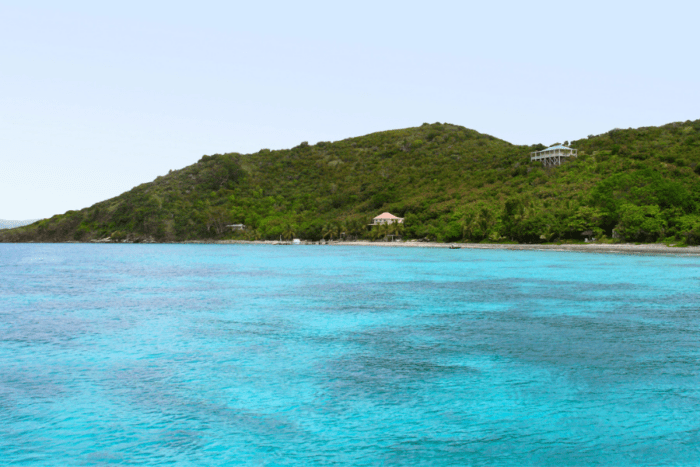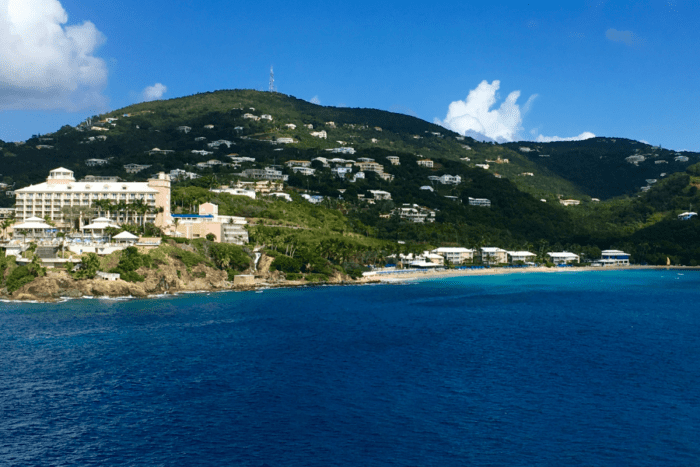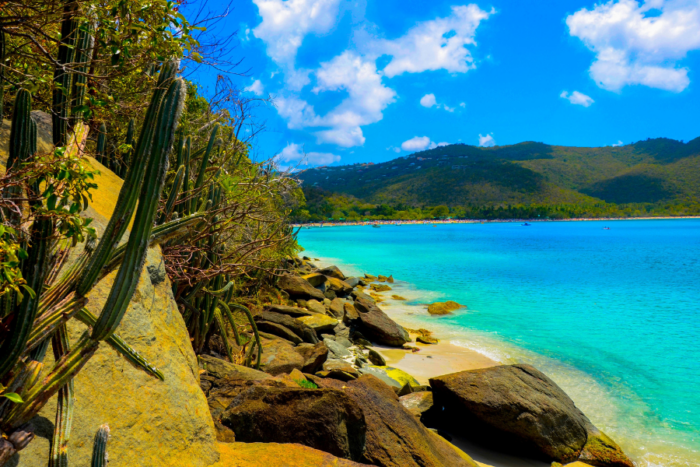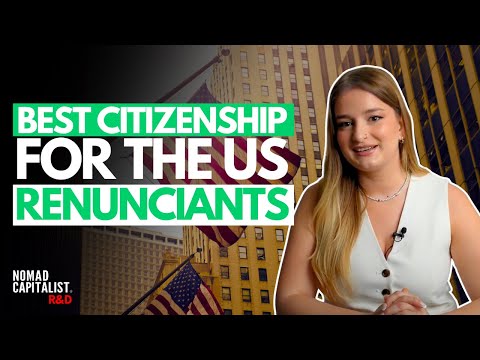Lower Your Taxes by Moving to the US Virgin Islands in 2025
January 23, 2025
Everyone knows that moving to Puerto Rico can reduce taxes, but the US Virgin Islands often gets overlooked despite providing the same benefits.
Since the US Virgin Islands is a US territory, it’s a great starting point for US citizens who want to explore their offshore options and lower their taxes but are hesitant about taking the leap of moving to a foreign country.
The Virgin Islands offers opportunities beyond the mainland US and can prepare you to go where you’re treated best.
Even if you’re not a US citizen, the islands have plenty to offer to the right person.
Want to know if the Virgin Islands is the right choice for you? We’ve helped thousands of investors and entrepreneurs discover the best offshore location for their unique needs. Click here to learn more about our holistic Nomad Capitalist plans.

The US Virgin Islands: an Overview
The United States Virgin Islands (USVI) consists of several islands and cays nestled in the northeastern Caribbean Sea.
The country is located 1,100 miles (1,770 km) southeast of Florida, 600 miles (966 km) north of Venezuela, and 40 miles (64 km) east of Puerto Rico. It also directly borders the British Virgin Islands to the west and south, which adds more cultural richness to explore.
With a population of around 85,000, the USVI has a small but very welcoming and close-knit community. English is the official language, and the US dollar is the local currency, making it a convenient destination for American travellers.
The territory has three major islands: St Thomas, St John, and St Croix. Each island has several small towns and cities, and the capital city, Charlotte Amalie, is located on St Thomas. Beyond these major islands lies a scattering of smaller islets and cays, each with its own unique character.
Water Island, for instance, is a popular escape for locals and expats seeking a beautiful beach escape.
The island nation is known for its white sand beaches and water activities like scuba diving.
USVI’s economy primarily relies on tourism, with the country receiving 2.5 to 3 million tourists yearly. Tourism, trade and other service-oriented activities account for nearly 60% of its Gross Domestic Product.
While US citizens born in the USVI cannot vote in presidential elections, they can visit the USVI without a passport, making it an ideal destination for a quick getaway or an extended escape.
Why Choose the US Virgin Islands?
For decades, the US government has attracted investors and entrepreneurs who want to live and plant a business flag in the USVI through lucrative tax incentives.
The advantages include:
- One of the most competitive tax packages in the Caribbean, fully endorsed by the US government and the Internal Revenue Service (IRS).
- The USVI is the perfect compromise for those who want to relocate for tax purposes without giving up their US citizenship (or at least not yet).
- It’s a great spot for individuals who don’t want to be associated with traditional tax havens but still want tax incentives.
- The USVI uses a mirror system of taxation known as the ‘mirror code’ where all US tax laws are mirrored by the USVI. The US Congress has granted USVI the authority to allow a lowered tax rate to its bona fide residents.
Any income related to a USVI business is also taxed at a lower rate. Bona fide residents pay taxes to the Virgin Islands Bureau of Internal Revenue (BIR) instead of the IRS.

The US Virgin Islands Tax Incentives
The United States Virgin Islands Economic Development Authority (USVIEDA) is a government vehicle that regulates several economic programs in the territory.
These include the Economic Development Commission (EDC) tax program, the USVI Hotel Development and Finance Program and the Enterprise Zone Tax Incentives (EZC) Program.
The most significant of all these tax programs is the EDC tax program.
The government developed this program to create jobs, boost economic activity and attract high-net-worth individuals to the islands.
The EZC program is similar to the EDC program in terms of tax benefits. However, EZC offers those tax benefits to companies located in the USVI’s historic towns and was developed to revitalise distressed communities on the islands.
Economic Development Commission (EDC) Tax Program
The EDC tax program grants major tax cuts to companies relocating to the USVI.
Under EDC, USVI resident companies can expect the following:
- 90% reduction in corporate income tax
- 90% reduction in personal income tax
- 100% exemption on excise tax
- 100% exemption on property taxes
- 100% exemption on gross receipts tax
- 1% duty on imported goods.
The top federal US income tax rate for 2025 is 37%, meaning that the top rate of income tax you’ll pay in the USVI is a mere 3.7%.
To be eligible for the tax benefits, an EDC applicant must:
- Hire at least ten USVI residents as full-time employees. The employees must have resided in the Virgin Islands for at least one year before being hired
- Invest at least US$100,000 (exclusive of inventory) in a sector or business that boosts the economic state
- Meet the requirements of Sections 934 and 937 of the Internal Revenue Code
- Be an investor in the business that you want tax benefits for. You can’t just be related to the business as a contractor, subcontractor, agent or something like that.
- Comply with all federal and local laws, including environmental regulations
- This one is a little odd, but you have to build or allow access to the beach or shoreline (if doing business on shoreline property).
The USVIEDA website states all the eligible activities for EDC applicants who want to do business there.
However, even if you don’t fall into any of the above categories, you may still be eligible for tax benefits if the relevant authorities deem your investment or business to favour the local economy.
In addition, the tax benefits last for 20 to 30 years, depending on the amount and location of the investment.

How to Pay Lower Taxes as a US Citizen
While the US Virgin Islands present a compelling case for tax optimisation, it’s not the only option available to US citizens. Let’s explore some alternative routes to reducing your tax burden.
Moving to Puerto Rico
As with the US Virgin Islands, moving to Puerto Rico can also help a self-employed US citizen reduce their tax burden while retaining their citizenship.
As a US territory, it requires no residence permits, allowing easy travel back to the mainland.
Under Act 60, residents pay a 4% corporate tax rate and no taxes on dividends. They may also benefit from no capital gains tax on gains after moving.
To qualify, you must live in Puerto Rico full-time for at least 549 days over three years, spending no more than 90 days in the US annually.
Puerto Rico must also be your tax home, and you need to show a closer connection to the island than the mainland.
Living Offshore
To lower your taxes as a US citizen, you can live offshore while retaining your citizenship.
The Foreign Earned Income Exclusion (FEIE) currently allows a tax-free salary of up to US$126,500 (adjusted annually).
While living offshore offers significant tax advantages, you will still fall under US tax laws, meaning you must continue filing US tax returns and report any foreign corporations or financial accounts.
Renouncing US Citizenship
For those seeking the ultimate escape from US tax obligations, renouncing your US citizenship is the definitive solution.
Many people choose this path primarily for tax benefits, as it eliminates the need to file US tax returns or report foreign income unless it’s derived from US sources.
It simplifies tax-related issues faced by US citizens living abroad, such as dealing with dual taxation, and can streamline estate tax planning.
However, renunciation may not be for everyone, especially those with US-sourced income or connections through business operations.
If you’re considering renouncing and would like to take the next step with confidence, contact us here.
US Virgin Islands Tax Advantages: FAQs
The Virgin Islands is a very safe destination to visit and relocate to. As with other countries in the region, standard precautions must be exercised, like taking care of personal belongings, but overall, the islands offer a safe environment for foreigners. The island has a tropical climate, with hurricane season running from June to November – something you should keep in mind if travelling there.
No, US citizens can enter, live and work in the US Virgin Islands without a passport, work visa or similar document.
The US Virgin Islands has the same tax rates as the United States, although significant tax incentives are available under certain circumstances.
The cost of living in the US Virgin Islands is higher than many parts of mainland US, although the tax benefits could mean it makes financial sense for people to retire there.
The US Virgin Islands isn’t a tax haven in the traditional sense, but residents can take advantage of many tax incentives.
Should You Move to the USVI to Lower Your Taxes?
Whether the Virgin Islands works for you will depend on your passport, assets, lifestyle and any number of other factors.
If you are a US citizen who doesn’t mind the slow pace of Caribbean island life, you may well fall in love with the USVI, especially if you qualify for the tax incentives.
Generally speaking, as an American citizen, it’s tough to reduce your tax rate to zero, thanks to the US’s citizenship-based taxation model.
In that case, a nearby US territory with the same language, currency and tax laws may be the best bet for those looking to cut their tax bill while still carrying a US passport.
However, your options grow tenfold if you’re not a US citizen and don’t have to worry about the IRS chasing you to the end of the earth.
As a non-US citizen, you have a wide choice of second residence or even second citizenship options that can potentially eliminate your taxes, enhance your lifestyle and expand your travel freedoms.
Whether you see your best life in the Caribbean or a highly developed European country, we can deliver the assistance to make your dream come true with minimum fuss.
At Nomad Capitalist, we believe in curating a tailored strategy that addresses all your needs and helps you go where you’re treated best.
Our clients are paired with experts in tax, investment strategy, asset protection and immigration to tailor and execute a plan as unique as your goals. Get in touch today to learn how a Nomad Capitalist plan can help you.


Does Puerto Rico Pay Taxes to the US?
It’s a common question and one that often fuels confusion, debate, and a fair share of misinformation – Do residents of Puerto Rico actually pay US federal taxes? When most people think of US tax obligations, they naturally assume they apply uniformly across all US citizens. But when it comes to Puerto Rico, things are […]
Read more

Zug Canton Taxes: The Ultimate Destination for Wealth Management in Switzerland
Switzerland’s global reputation is built not just on stunning views of Alpine peaks and serene lakes but also on a foundation of exceptional quality of life, world-class infrastructure and investor-friendly tax policies. The results speak for themselves: efficient public transport seamlessly links cities and villages; the standard of living regularly ranks among the highest in […]
Read more

How Smart Investors Use Venture Capital to Build Wealth
Big companies like Google, Amazon, Facebook and Apple all started out as bold ideas backed by venture capital. Decades later, the same firms are household names, as familiar to most people as electricity, the internet, or the telephone. But hindsight is a fickle friend. The truth is, it wasn’t always so obvious they’d succeed. These […]
Read more





